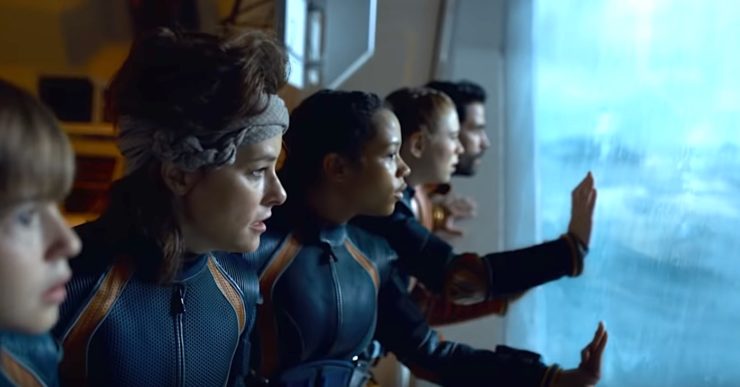It’s been over eighteen months (in realtime) since we last saw the Robinsons and their unintentionally adopted new crew members. Now they’re back, and in addition to family bonding time, we’re getting a whole new perspective on the world they’ve left behind and the future humanity is trying to build.
(Some spoilers for Lost in Space season 2.)
After spending roughly seven months on an alien world, the Robinsons are forced to abandon what home they’ve managed to construct for themselves, and are back in the action once again. They reunite with the Resolute, and with the 24th colonist group, who have set up shop on another nearby world. Will (who seems to have grown about a foot since we last saw him) is intent on finding Robot, while everyone else is still hoping they can finally make it to Alpha Centauri. Things go as wrong as they usually do, with a metal corroding infection that spreads from the planet’s surface, an alien attack imminent, and a lot of personal injuries for John Robinson, who just wants to be useful to his wife and kids.
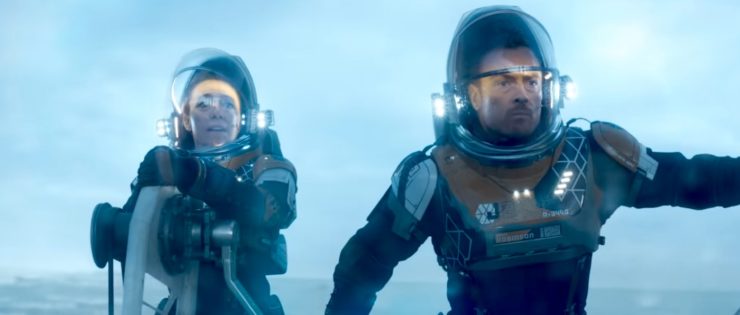
There are a lot of the same silly science fiction tropes that the first season brought, with a new world populated by space raptors and space buffalo, as well as plenty of plot progressions that clearly only happen because “that’s what the episode needs to do”, but given how the last season worked out, it was unlikely to change. Needless to say, if that was an area where you hoped Lost is Space might improve, this season is unlikely to impress you. It is Swiss Family Robinson in space, after all. The survival aspect is the primary concern in a story like this, and the hits sure do keep coming in that regard.
There are some significant course corrections in season two that make the show much stronger as an entity. The first is the scrapping of the deeply uncomfortable flirtation that went down between Don West and Judy Robinson in the first season (there’s a clear and sizable age gap between the actors), which made West’s character come off like a creep and damaged his ability to be viewed as remotely trustworthy or likable. This season we find West has settled into the Robinson family dynamic, and is now much closer to a weird uncle/much older brother to the Robinson kids. They’ve come to view him as a member of their little cadre, and West appreciates being a part of the crew, even as he complains over all they ask of him. They’ve encouraged a sense of responsibility in him, too strong to shy away from the needs of others.
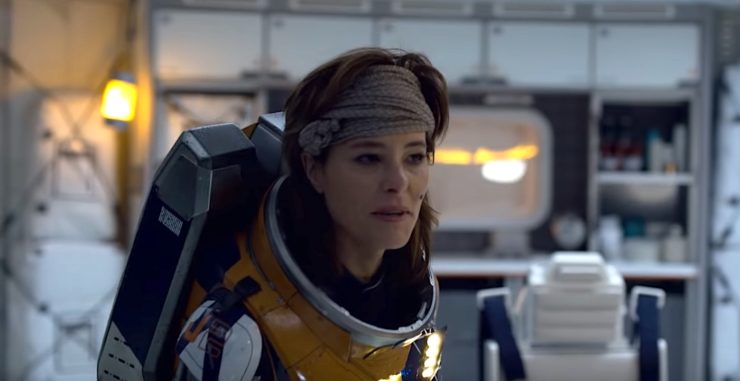
Better handled as well is the character of Dr. Smith, whose arc in the first season was just a little too cruel (and muddy on top of it) to let her really shine. The second season wastes less time on trying to explain away the reasons for Smith’s behavior, which are always unsatisfying, and lets her simply be. In this season, Dr. Smith does what the character has always done best from inception—play the wild card to the steadfast and reliable Robinson family. What makes this more enjoyable is the fact that none of the protagonists ever trusts Smith completely; the family doesn’t develop collective amnesia the instant she does something useful, but rather remains cognizant of her self-serving nature. It makes her machinations more fun to watch, as the Robinsons continue to engage with her because they know that ignoring her is a far more dangerous exercise.
One of the best episodes of the season is “Run” by Vivian Lee, highlighting the bond between John and Judy Robinson. While Judy is John’s adopted daughter, he made mention in the previous season that out of his three kids, she is the one he relates to and understands the most. “Run” is a testament to their bond as a father and daughter, but moreover to the change that happens when a child finally becomes an adult, and occasionally has to be the adult in the relationship with their parents. As we witness Judy mirror the love and care her father gave her as a child in a life-threatening situation in the present, we’re reminded of the reasons why centering the narrative of Lost in Space around the Robinson family remains so affecting and rewarding.
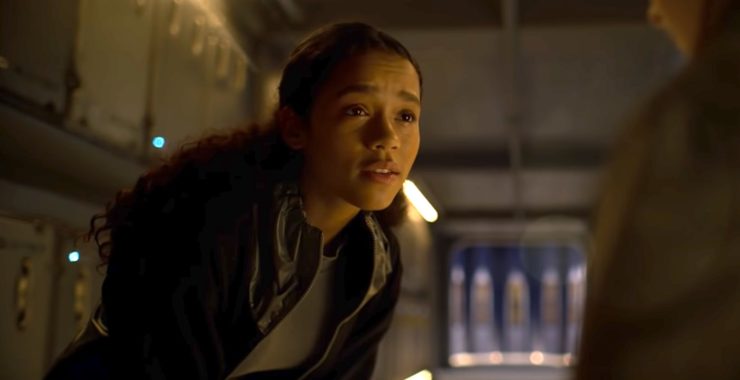
Many of the narrative threads that didn’t make sense in the first season are also fixed or elaborated on in the second. We get background on the Robot and his species, how humans have been using them, and keeping this all under wraps to mask the torture being carried out against alien life. We learn more about the robots, and though their mysteries are far from solved, we can see how their continued presence might play into the narrative going forward. The colonists themselves are more canny this time around, and it’s clear that there are areas where they are being kept in the dark by people in power. There’s less strife among the people on the ground, as they’ve come to terms with their need to rely on one another for survival.
Both Will and Penny have throughlines in the season about learning how to be better friends, which makes sense as a tween and teen who are doing the hard work of actually growing up in space, away from everything they’ve ever known. On Penny’s end there’s also a need to learn her own value as the one person in her family with what the world has erroneously termed “soft skills”, writing and communication and humor. Will’s relationship with the Robot is a very different animal in season two, which sees Will finally come to terms with the robot’s sentience and individuality, and recognize that you cannot control a friend and still call them a friend. This plotline also questions the concept of consent around a being that cannot readily make its wants and needs known, and all the horrifying places that leads us.
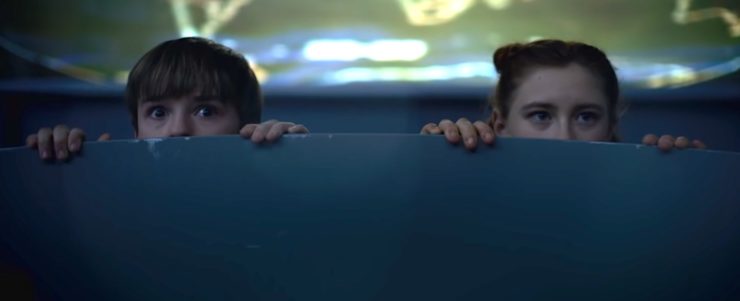
There’s an unsettling aspect to Lost in Space that the show is beginning to chip away at, slowly but incredibly deliberately—the Robinson family is put on something of a pedestal in this season, with many people citing just how impressive they are as a team, how their belief in one another is akin to a superpower, and how there’s literally nothing that they cannot accomplish together. While it’s a nice message to send out about family unity, it’s also ultimately just a broader concept of rugged American individualism that doesn’t serve as an answer to all the universe’s problems by a long shot. People need communities, need friends, need collaborators. The Robinsons may be exceptional at inspiring themselves and others, may be smarter than a lot of people, but that doesn’t make them better. It also doesn’t make them more worthy.
This concept of worthiness keeps coming up in the second season, particularly as it pertains to the big reveal back from season one—that Maureen had one of Will’s test scores changed so that he could enter the colonist program and her family could stay together. It’s an act that speaks to the sort extreme privilege that we’ve been confronting recently in the real world—think the college admission scandals of the past year—even if we can sympathize with Maureen’s motives. That choice comes back to bite her (and everyone) in a terrible way, but more importantly, it casts a shadow on the entire system by which humanity is surviving. We know the Earth is uninhabitable. We know that the only people who will make it off the planet are people who pass these ridiculous tests, which appear to automatically count out anyone with disabilities, mental health issues, previous trauma, or a lower level of human-defined “intelligence.” What Lost in Space seems to be moving toward with each storied step is an essential realization: If we don’t take pains to assure that everyone has a place in the future, then maybe we don’t deserve a future at all.
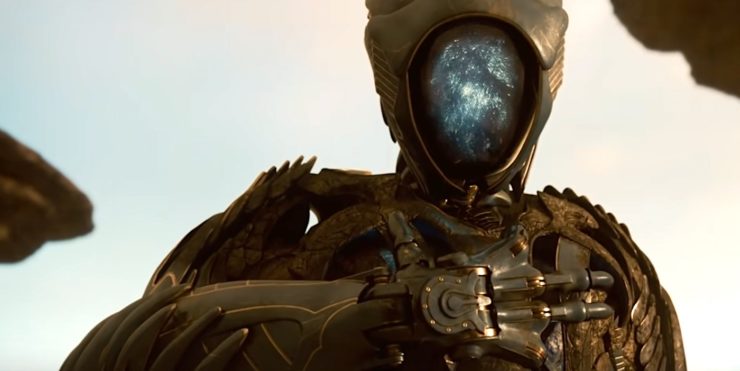
If Lost in Space continues, and gets to keep exploring these ideas, we’ll have a show that moves far beyond the old gamut of space frontiers and into the realm of mutual cooperation and appreciation of all life. Here’s hoping we get to see it.
Emmet Asher-Perrin is still in awe of that Robot costume and the actor inside it, though. You can bug him on Twitter, and read more of her work here and elsewhere.










